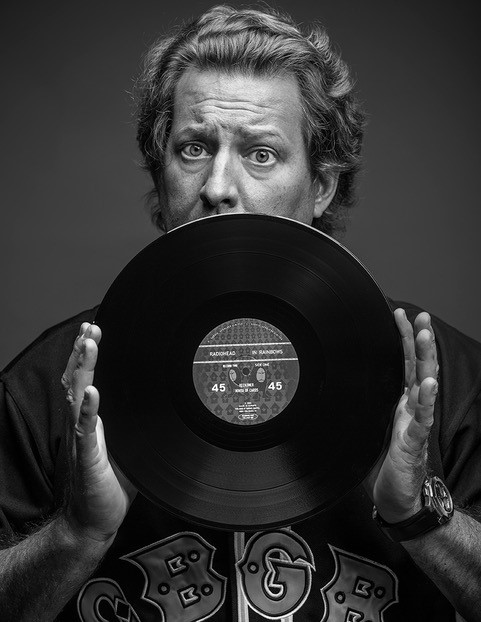 Alan Cross is one fascinating guy. He is walking, talking music resource, spending his waking hours scouring the universe for facts, data, and stories that are about his favorite topic – music. He’s a radio guy, but also an interviewer, blogger, and speaker.
Alan Cross is one fascinating guy. He is walking, talking music resource, spending his waking hours scouring the universe for facts, data, and stories that are about his favorite topic – music. He’s a radio guy, but also an interviewer, blogger, and speaker.
He’s written four books, wrote a national newspaper column in his native Canada, and co-hosts podcasts. His documentary series, The Ongoing History of New Music has been going strong for 20 years.
I’m a regular at “A Journal of Musical Things” – a fun, whimsical, and fascinating look at the music world through Alan’s unique lens. I recommend it highly.
For today’s “Guest List,” Alan crafted 5 things about music that most of us don’t know – and as always, over-delivered a bit. – FJ
I spend all my waking hours digging for topics for my long-running radio documentary, “The Ongoing History of New Music” (It’s seriously good.) Email me at [email protected] if you want to become an affiliate. Try out the podcast through iTunes.)
Here are five of my favourite musical facts:
1. The original phonographs and gramophones were 100% acoustic devices.
They appeared before anyone figured out how to make electric amplifiers. This meant there was only one way to turn down the volume of a phonograph or gramophone. It was a fabric ball called a “sock” which you had to jam into the acoustic horn of the machine. This is the origin of the phrase “stick a sock in it.”
2. Have you ever had a health issue that involved getting a CAT Scan? Then thank the Beatles.
Not only was EMI a record label, the parent company was also an industrial research company. The money from all the hits brought in by the Beatles helped fund research that allowed the company to invent the CT scanner, which was released to the public in 1972. The engineer behind the project, Godfrey Hounsfield, went on to win the Nobel Prize for medicine in 1979.
3. When he was in high school, Mick Jagger was quite the basketball player.
In fact, he was named captain of the squad at his school. But one day he collided with another player, causing Mick to bite off the tip of his tongue. From that point on, his once-posh accent became slight more “street,” influencing not only the way he talked but how he sang. Makes you wonder what might have happened to Mick, the Stones and rock’n’roll in general if he had just kept his head up, doesn’t it?
3a. BONUS INJURY FACT: And we owe a lot of today’s alt-rock to a piece of sheet metal. On his last day at work at a Birmingham factory, a 17-year-old Tony Iommi had the tips of his middle and ring fingers on his right hands cut off by a slice of sheet metal. To compensate for the injury, he started stringing his guitar with ultra-light banjo strings, which made it easier to form chords and bend strings. And to make it even easier, he began tuning his guitar lower, which loosened up the strings even more. This contributed to the overall deep, sludgy sound of Black Sabbath. That in turn had a very pronounced effect on the development of what was called Grunge. Makes you wonder where we’d be without that hunk of sheet metal, no?

4. Everyone uses the f-word in lyrics these days. But who was the first?
As far as anyone can tell, the first deliberate use of an f-bomb on record was a 1965 song called “CIA Man” by The Fugs.
4b. BONUS F-BOMB FACT: Paul McCartney drops the f-bomb in “Hey Jude.” You can hear it if you try at about two minutes and fifty-three seconds into the song just after the phrase “Remember to let her under your skin.”
4c. BONUS FILTH FACT: You know the part in the “South Park” theme song? Kenny is singing something very, very foul. No one’s bothered to censor it because you can’t make what he’s singing, anyway.
5. Melba toast—that dried up stuff that you eat when you’re on a diet—was named after an Australian opera singer named Dame Nellie Melba back in 1887.
It was created for her by a chef (who was also a fan) when she was feeling poorly and needed something for her delicate stomach.
More Guest Lists
- Tamar Charney: 5 Tips For Great Podcasts
- Jay Kernis: 5 Things I Learned in Television that (Public) Radio Should Know
- Jim McGuinn: 5 Things The Current Knew It Had To Do When Prince Died
- Jim Cutler: 5 Tips To Help Radio Turn Empty Imaging into Solid Content
- Mark Biviano: 5 Ways Radio Can Win With Event Marketing
- How AI Can Give Radio Personalities More…PERSONALITY - April 23, 2025
- Can Radio Afford To Miss The Short Videos Boat? - April 22, 2025
- Media And Technology In 2025: Believe It Or Not! - April 18, 2025





Leave a Reply